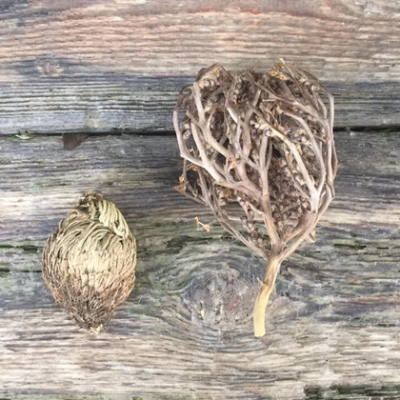ROSE OF JERICHO
The True Rose of Jericho vs. False Rose of Jericho
The True Rose of Jericho (Anastatica Hierochuntica) vs. False Rose of Jericho (Selaginella Lepidophylla)
In the mesmerizing realm of botanical wonders, two enigmatic plants share the name “Rose of Jericho.” However, they are distinct in their characteristics and properties, captivating botanists, spiritualists, and nature enthusiasts alike. This article delves into the intriguing differences between the True Rose of Jericho, scientifically known as Anastatica Hierochuntica, and the False Rose of Jericho, scientifically known as Selaginella Lepidophylla.
The True Rose of Jericho (Anastatica Hierochuntica)
A Miracle Plant
The True Rose of Jericho, or Anastatica Hierochuntica, is truly a marvel of nature. This fascinating plant is known for its extraordinary ability to survive extreme desert conditions, making it a symbol of hope and endurance. Native to arid regions across North Africa, the Middle East, and the Arabian Peninsula, the True Rose of Jericho has been celebrated for its magical properties for centuries.
Physical Characteristics
The True Rose of Jericho is a small perennial herb with grayish-green leaflets. When faced with harsh drought conditions, it curls up into a tight ball, resembling a lifeless tumbleweed. However, when it receives even the tiniest amount of water, it miraculously unfurls its branches and comes back to life, exhibiting a breathtaking transformation.
Natural Habitat
This hardy plant thrives in arid desert regions where water is scarce. Over time, it has adapted to these harsh environments, evolving special mechanisms to conserve water and withstand long periods of drought. Mostly in the Judean desert of Israel
Cultural Significance
In various cultures, the True Rose of Jericho is revered for its association with resurrection, rebirth, and spiritual cleansing. It is believed to bring blessings, prosperity, and protection when placed in homes or used in traditional ceremonies.
The False Rose of Jericho (Selaginella Lepidophylla)
A Resurrection Plant
The False Rose of Jericho, scientifically known as Selaginella Lepidophylla, is another captivating desert plant celebrated for its resilience. Just like its True counterpart, the False Rose of Jericho is referred to as a resurrection plant due to its incredible ability to revive after periods of drought.
Physical Characteristics
The False Rose of Jericho features delicate green foliage when hydrated. However, during dry spells, it curls up into a ball, appearing lifeless and desiccated. Once water is supplied, it comes back to life, unfurling its branches and exhibiting its wondrous resurrection.
Natural Habitat
This intriguing plant is native to the arid regions of the Chihuahuan Desert in North America. Similar to the True Rose of Jericho, it has adapted to survive in these harsh conditions by conserving water and undergoing temporary dormancy during prolonged droughts.
Cultural Significance
The False Rose of Jericho, like its True namesake, also holds spiritual significance in various cultures. It is believed to bring luck, blessings, and positive energy to the surroundings when utilized in traditional rituals.
How to Differentiate Between the Two Roses?
Distinguishing between the True Rose of Jericho and the False Rose of Jericho requires a keen eye and attention to detail. Consider the following factors:
Visual Appearance
The True Rose of Jericho (Anastatica Hierochuntica) has grayish-green leaflets and appears slightly larger compared to the False Rose.
The False Rose of Jericho (Selaginella Lepidophylla) has delicate green foliage with smaller leaflets.
Response to Water
When supplied with water, both roses unfurl their branches and transform from a desiccated ball to a green, vibrant plant.
Fun Facts True Rose of Jericho
The True Rose of Jericho has earned the nickname “Resurrection Plant” for its ability to revive after long periods of drought.
It has been used in cultural practices for centuries due to its spiritual significance and association with renewal.
Fun Facts False Rose of Jericho
This unique plant has captured the interest of botanists worldwide due to its ability to revive after periods of drought, similarly to the True Rose of Jericho.
Its scientific name “Selaginella Lepidophylla” is derived from the Greek words “selaginella,” meaning little club, and “lepidophylla,” meaning scale leaf, describing its appearance.
In the enthralling tale of the True Rose of Jericho (Anastatica Hierochuntica) and the False Rose of Jericho (Selaginella Lepidophylla), we witness nature’s incredible ability to adapt and survive in the harshest environments. These two mystical plants, with their unique characteristics and cultural significance, continue to captivate and inspire awe. As we celebrate their resilience and spiritual symbolism, let us cherish and protect these botanical wonders for future generations to admire and cherish.
FAQs
Are both the True and False Rose of Jericho real plants?
Yes, both the True Rose of Jericho (Anastatica Hierochuntica) and the False Rose of Jericho (Selaginella Lepidophylla) are real plants with extraordinary abilities to survive extreme desert conditions.
What are the cultural beliefs surrounding the True and False Rose of Jericho?
Both roses are believed to bring blessings, prosperity, and spiritual cleansing in various cultures when used in traditional rituals and ceremonies.
But the True Jericho rose that grows in Israel is sacred to Christianity because of the stories told about it with the Holy Mary and Jesus.



